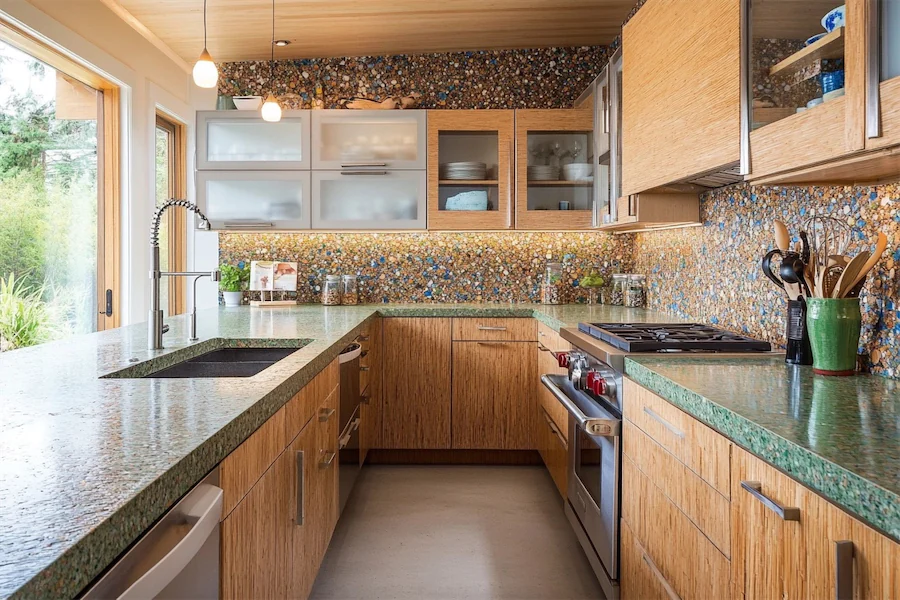Designing a kitchen with recycled materials is an eco-friendly approach that combines sustainability with unique aesthetics.
Key Features of Recycled Material Kitchens
- Recycled Glass Countertops: These surfaces are crafted from crushed glass embedded in concrete or resin, offering a durable and visually striking option. They are resistant to stains and scratches, making them both practical and sustainable.
- Reclaimed Wood Cabinetry: Utilizing salvaged wood for cabinets and shelves adds rustic charm while reducing the demand for new lumber. Each piece carries its own history, contributing to a unique and personalized kitchen design.
- Recycled Plastic Surfaces: Materials like Polygood, made entirely from recycled plastics, can be used for countertops and wall panels, providing a modern and eco-friendly alternative. These surfaces are available in various patterns and colors, resembling materials such as terrazzo or marble.
Applications of Recycled Materials in Kitchen Design
- Flooring: Incorporate recycled tiles or reclaimed hardwood flooring to enhance sustainability. These materials not only reduce environmental impact but also add character and warmth to the kitchen space.
- Backsplashes: Use tiles made from recycled glass or ceramics to create eye-catching and eco-friendly backsplashes. These tiles come in various designs and colors, allowing for creative expression while maintaining environmental responsibility.
- Furniture: Select dining tables and chairs crafted from reclaimed materials to complete the sustainable kitchen aesthetic. These pieces often feature unique textures and finishes, contributing to a distinctive and environmentally conscious design.
Considerations When Designing a Recycled Material Kitchen
- Material Sourcing: Ensure that recycled materials are sourced from reputable suppliers to guarantee quality and authenticity. Working with certified providers can help in obtaining materials that meet environmental standards.
- Durability: While recycled materials are eco-friendly, it’s essential to assess their durability and suitability for kitchen use to ensure longevity. Consulting with professionals can aid in selecting materials that balance sustainability with functionality.
- Maintenance: Some recycled materials may require specific maintenance procedures; understanding these needs will help preserve their appearance and functionality over time. Regular care and appropriate cleaning methods can extend the lifespan of these materials.
Conclusion
Incorporating recycled materials into your kitchen design not only contributes to environmental sustainability but also adds unique character to your home. By thoughtfully selecting and integrating these materials, you can create a functional, durable, and eco-friendly kitchen space.
